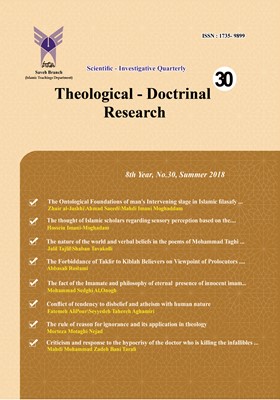-
-
List of Articles
-
Open Access Article
1 - (The Ontological Foundations of man's Intervening stage in Islamic filasafy and Mysticism (‘Irfān
zhuir al-jashhi Ahmad saeidi مهدی ایمانی مقدم -
Open Access Article
2 - The thought of Islamic scholars regarding sensory perception based on the viewpoint of Mulla Sadra philosopher
hossein imani moghadam -
Open Access Article
3 - The nature of the world and verbal beliefs in the poems of Mohammad Taghi Aliabadi Mazandarani
jalil tajlil شعبان توکلی -
Open Access Article
4 - The Forbiddance of Takfir to Kiblah Believers on Viewpoint of Prolocutors and Jurists of Shia and Sunni
abbasali rostami -
Open Access Article
5 - The fact of the Imamate and philosophy of eternal presence of innocent imam(pbu)from view point of quran with emphasize on the Tabataba'i's view
Mohammad -
Open Access Article
6 - Conflict of tendency to disbelief and atheism with human nature
Fatemeh Alipour seyyedeh tahereh aghamiri -
Open Access Article
7 - The rule of reason for ignorance and its application in theology
morteza motaghi nejad -
Open Access Article
8 - Criticism and response to the hypocrisy of the doctor who is killing the infallibles based on the views of the Shia theologians
Mahdi MohammadZadeh BaniTarafi
-
The rights to this website are owned by the Raimag Press Management System.
Copyright © 2017-2026







